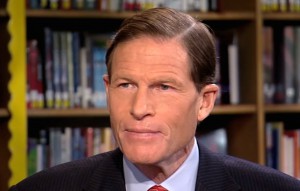
Sen. Ed Markey and Sen. Richard Blumenthal are pushing the FCC to restrict access to DSRCs to cut down on hacking.
Cyber security is growing into a major issue for the automobile industry as new technology proliferates in cars and on roadways. Now, a pair of U.S. senators are looking to the Federal Communications Commission to exert tighter control over the short-range frequencies that enable cars to “talk” to each other.
Concerns about car hacking have already caught the attention of the Department of Transportation and the U.S. Department of Justice.
Edward J. Markey, D-Mass., who has long played a role in shaping telecommunications policy on Capitol Hill, and Richard Blumenthal, D-Conn., who has taken an interest in automotive-related issues, are also asking the FCC to explore whether the use of short-range communications, which many experts consider to be a key technology for autonomous and semi-autonomous driving vehicles could be threatened by hacking.
Markey and Blumenthal asked the FCC to review “Dedicated Short Range Communications” frequencies, which wirelessly send telemetric data like speed and vehicle location from car to to other vehicles and to devices along the roadway that are positioned to guide traffic.
(Mercedes teases new Maybach coupe concept coming to Concours. For more, Click Here.)
Experts in Silicon Valley and Detroit believe information from other vehicles on the road and how fast they are moving is critical to helping cars avoid accidents. But the signals, even with their limited range, also could be used by hackers to tamper with cars or to steal data, including information on bank accounts and credit cards.

Sen. Richard Bluenthal (D-Conn.) is teaming with Sen. Ed Markey (D-Mass.) to pressure the FCC to restrict access to certain frequencies.
The senators have asked the FCC to consider tighter controls on DSRC, according to The Hill, a website dedicated to politics and policy
“Nearly all vehicles on the market include wireless technologies that could pose vulnerabilities to hacking or privacy intrusions,” the letter said. “Despite this threat, security measures to prevent remote access to vehicle electronics are inconsistent and haphazard across the market.”
(Click Here for details on the good deals on new vehicles in August.)
Markey and Blumenthal also asked the FCC to consider, restricting the use DSRC communications to safety technologies, rather than opening it up to commercial applications — thus limiting the number of potentially vulnerable software in each car. Such a proposal could prove controversial since many companies and services are lining up to explore the technologies potential for reaching motorists.
In addition, Markey and Blumenthal said the FCC should consider rules that require anyone using the DSRC spectrum to submit and continually update privacy and cyber security plans.
The senators also said DSRC spectrum users should be required to notify appropriate law enforcement, government agencies and consumers if a serious breach occurs and take appropriate steps to mitigate the harms of such a breach.
(To see more about a woman parking her Mercedes … on a Ferrari 458, Click Here.)
“In this new era, safety, cyber security, and privacy cannot be an afterthought. We must ensure that these vehicles have robust safety, cyber security, and privacy protections in place,” Markey and Blumenthal wrote.
